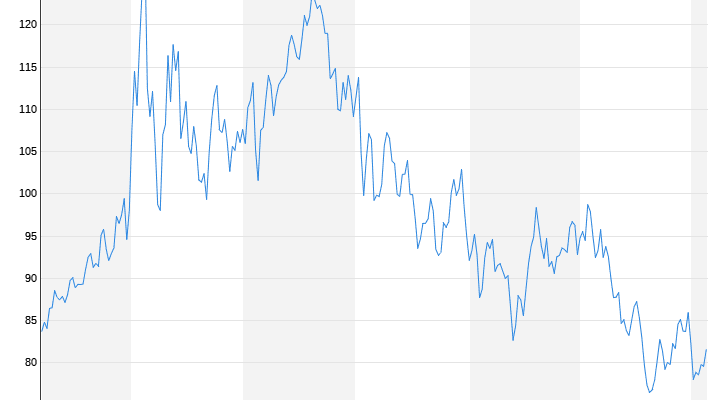Kremlin miscalculated
Putin has a huge oil problem
By Jan Ganger
01/11/2023, 4:00 p.m
Russia must sell off its oil. This shakes the state budget. The central bank warns of the consequences of war and sanctions.
Oil prices are falling. This causes considerable difficulties for the Kremlin, since it finances the war in Ukraine with the proceeds. Russia’s state budget is largely based on the proceeds from oil sales. But the country is currently selling off its oil in view of the western sanctions. Last year, a barrel of the Russian reference variety Urals cost around 76 US dollars on average. It’s currently available for around $50. According to estimates, it costs around 40 dollars to mine a barrel – this price is approaching the point at which it is no longer worth pumping the Urals out of the ground.
Last year, oil prices shot up temporarily in the wake of the Russian invasion of Ukraine. The Brent (from the North Sea) and WTI (from the USA), which are most important for the West, cost more than 100 US dollars per barrel at their peak. However, prices are now back to below 80 dollars and thus to the level before the invasion please.
However, the price of Russian oil has fallen even more sharply. A barrel of Urals currently costs a whopping $30 less than Brent. This discount is remarkable. Before the raid, the price difference between the two varieties was less than a dollar per barrel.
China demands cheap oil
There are two main reasons for the huge price difference. On the one hand, Russia has to look for other customers after the West’s import ban. However, these – above all China and India – are pushing through strong price reductions because Russia urgently needs buyers for its oil. Since the beginning of December, the EU has banned the import of Russian oil by ship – the country has thus lost what was by far its most lucrative and most important sales channel. Another consequence of the embargo: Russian oil tankers now have to travel thousands of kilometers longer to supply Asian customers. This drives up transportation costs and squeezes profit margins even further.
The other reason for the difference between Brent and Urals is the EU’s price cap on Russian oil, which the G7 countries and Australia have joined. The measure bans shipowners, financiers and insurers from trading in Russian crude oil if its price is above the $60 threshold since early December. True, this is higher than the current Urals price. What is striking, however, is that the price difference between Urals and Brent suddenly widened to the current level when the price cap came into force.
However, whether the price for Urals will stay this low in the long term is an open question. Russia could try to push it up by cutting production. In addition, China’s economy is likely to pick up speed after the abrupt end of the strict zero-Covid policy and thus ensure more oil demand and higher prices.
But that doesn’t change the fact that the Kremlin may have miscalculated its state budget. Because he sets a Urals price of 70 dollars for this year – that is far more than is paid today and is well above the G7 price cap.
deficit increases
The problems became apparent as early as December, when Russia’s budget deficit widened sharply. This was mainly due to the fact that revenues from energy exports shrank and expenditure on the war in Ukraine rose. According to calculations by the financial news agency Bloomberg, the deficit last month was the equivalent of 56 billion dollars. That is more than the surpluses accumulated in the previous eleven months, which were accumulated in view of the temporarily very high oil and gas prices.
According to Russian Finance Minister Anton Siluanov, the deficit for the past year totaled around 47 billion dollars. That is about 2.3 percent of the gross domestic product. Before the war began, the government had announced a surplus. As recently as September, Putin promised that Russia would generate a surplus of almost $7 billion.
But nothing came of it. In recent months, the government has been forced to tap into the sovereign wealth fund, which is still well stocked. So far, the Russian economy has held up well despite Western sanctions. The International Monetary Fund estimates that gross domestic product fell by 3.4 percent last year and will shrink by another 2.3 percent this year. Meanwhile, the Russian central bank warned that sanctions and war could hit Russia’s economy harder than previously expected.
